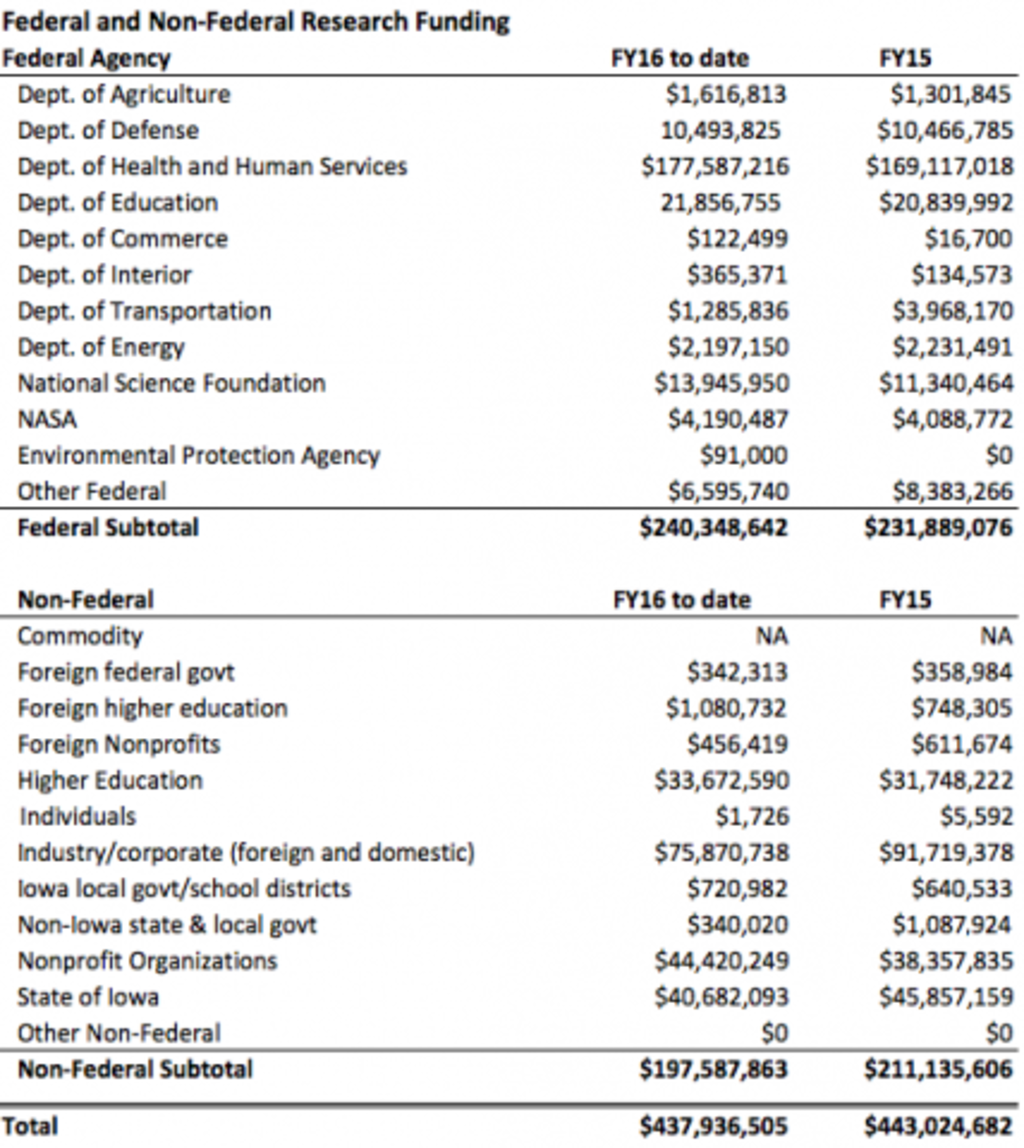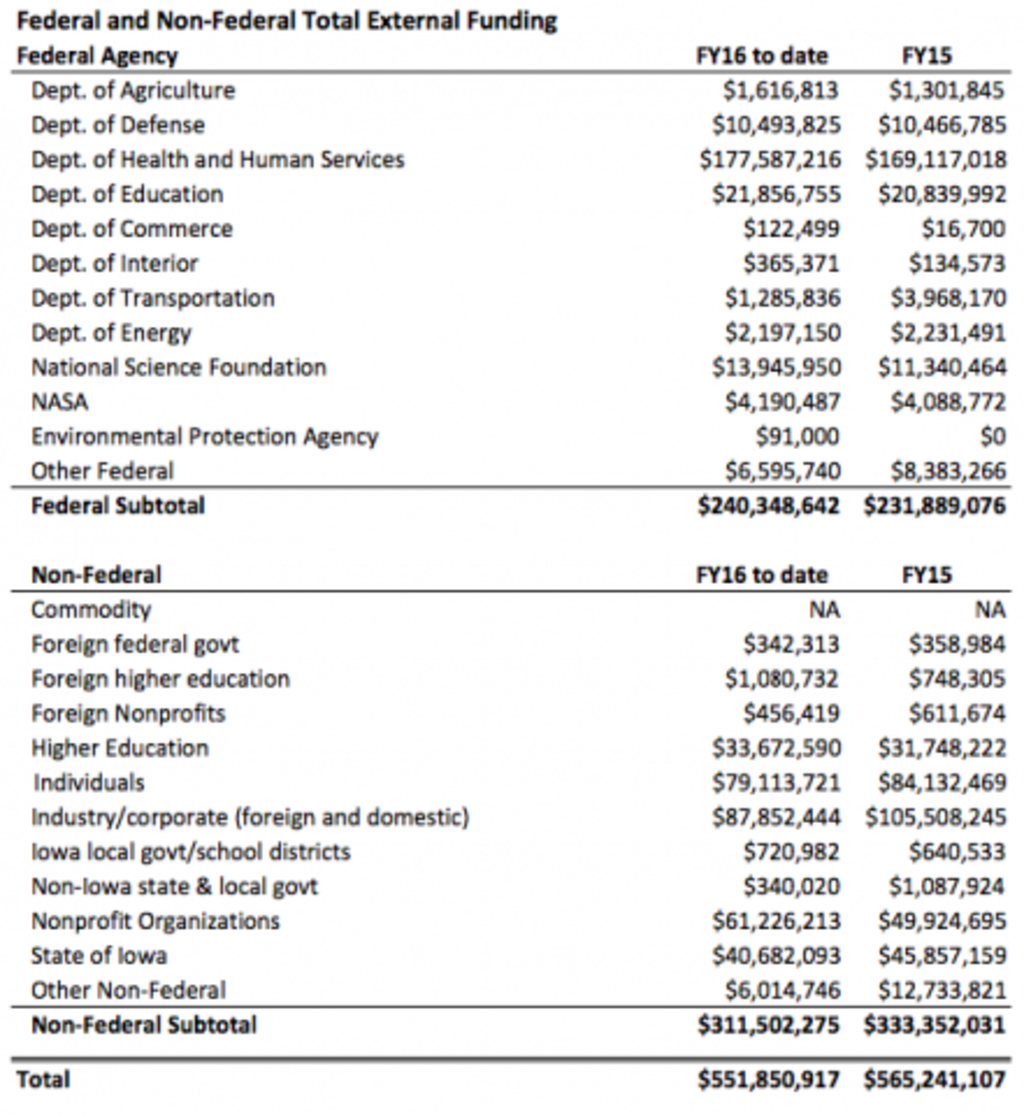Federal support of University of Iowa research and scholarship increased 4 percent in fiscal year 2016, with substantial gains from both the National Institutes of Health (NIH) and National Science Foundation (NSF).
Federal research funding increased $8.5 million over FY15, from $231.9 million to $240.4 million.
“Our researchers and scholars continue to be driven by a deep desire to understand how the world works and to find solutions to life’s most pressing challenges, despite what continues to be a very difficult funding environment,” says Daniel A. Reed, UI vice president for research and economic development (OVPR&ED). “Federal support for research is being eroded by inflation, and the international ranking of the U.S. in support for basic research as a fraction of GDP continues to decline.”
Support from the NIH, by far the largest source of public research funding at the UI given its world-class biomedical research, increased 9 percent, from $146.7 million in FY15 to $159.4 million in FY16. Grants from the NSF also increased, from $11.3 million to $13.9 million—a 23 percent rise. Funding from the Department of Education rose $1 million, or 5 percent, from $20.8 million to $21.9 million.Also up in FY16 were the total number of grant proposal submissions (up 3 percent, from 3,607 to 3,724) and total number of awards granted (up 5 percent, from 2,240 to 2,352).
Meanwhile, total external funding (which includes gift commitments and charitable grants supporting research through the UI Foundation) declined 2 percent, from $565.2 million to $551.9 million, while combined public and private funding of research slipped 1 percent, from $443 million to $437.9 million.
Reed said there is still much to celebrate in the latest numbers.
“Insight and discoveries gleaned by our investigators stand to benefit millions of people, here in Iowa and across the globe,” Reed says.
In addition to forging new roads of discovery, UI faculty and staff are working to preserve important knowledge already gained through decades of previous research—and to make it accessible to everyone. Earlier this year, the UI’s Hardin Library secured a five-year, $6.5 million grant from the NIH and a prestigious designation as a Regional Medical Library in the National Network of Libraries.
As a Regional Medical Library, the Hardin Library’s role will be to support the National Library of Medicine in its efforts to provide all U.S. health professionals with equal access to biomedical information and improve the public’s access to information so physicians and citizens can make informed decisions about their health.
“Insight and discoveries gleaned by our investigators stand to benefit millions of people, here in Iowa and across the globe.”
—Dan Reed, vice president for research and economic development
Funding is also being captured by UI faculty to promote education in the humanities.
Lori Branch, associate professor of English, is co-leading a four-week National Endowment for the Humanities (NEH) seminar on campus titled “Postsecular Studies and the Rise of the English Novel, 1719-1897.” The seminar is funded through a $139,000 NEH grant.
Reed says research funding continues to spur tech transfer as investigators work to bring treatments and medical devices from labs and benchtops to the marketplace to directly benefit the public.
Investigators with UI startup iotaMotion, for example, won $225,000 through the NSF’s Small Business Innovation Research/Small Business Technology Transfer program to develop prototype of a device to non-invasively improve hearing for the estimated 100,000 people in the United States and more than 300,000 people worldwide who have cochlear implants. The device externally adjusts cochlear implant settings to compensate for the continued decline of hearing that can occur naturally after the device is implanted, extending the life of the implant and improving the lives of patients.
The university also saw fruits born from its participation in the NSF’s Innovation Corps (or I-Corps) program, established at the UI last year to accelerate the development of technologies based on UI research.
Zhendong Jin, founder of InnoBioPharma and associate professor of medicinal and natural products chemistry in the UI College of Pharmacy, was awarded a $50,000 grant for completing national I-Corps training, to be used toward the development of anti-cancer agents derived from a rare deep-sea sponge.
And I-Corps participant Chioma M. Okeoma, assistant professor of microbiology in the UI Carver College of Medicine, received $50,000 to develop novel targeted therapy for metastic breast cancer.
Other bright spots in the FY16 funding landscape include new NSF grants in support of the UI’s ongoing commitment to promoting STEM education and careers, including two out of the Department of Chemistry in the College of Liberal Arts and Sciences.
Nicole Becker, assistant professor of chemistry, received a $1.4 million NSF grant to explore ways to encourage students at both the UI and Kirkwood Community College to consider secondary science teaching careers. And Renee Susan Cole, associate professor of chemistry, received a $462,000 NSF grant to develop resources to help K-12 STEM instructors better assess students’ process skills: their use of communication, teamwork, critical thinking, and problem-solving.
The Office of the Vice President for Research and Economic Development provides resources and support to researchers and scholars at the University of Iowa and to businesses across Iowa with the goal of forging new frontiers of discovery and innovation and promoting a culture of creativity that benefits the campus, the state, and the world. More at research.uiowa.edu, and on Twitter: @DaretoDiscover.

